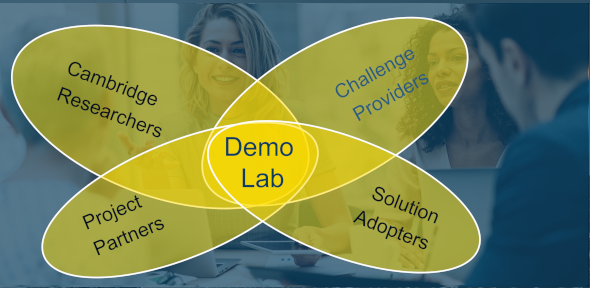
The Cambridge Zero Demonstrators Lab will focus on a handful of challenges in each iteration of the Programme. A competitively selected cohort of Cambridge researchers will assemble into teams and select challenges they want to focus on and build their projects around. Each team will then work on the selected challenge part-time over a period of 12 weeks (Sprintshop project); they can pick from challenges we receive or formulate their own.
In the Pilot round of the Programme (Dec 2021 - March 2022) the funding for the cohorts is provided by the EPSRC IAA Adventurous Impact award, and as such the work to be undertaken must be within EPSRC's remit and must have a link to prior EPSRC funding, however the nature of the link can be flexible.
How to propose a challenge
We welcome challenge ideas summarised on the Challenge proposal form (download the editable file here), and sent by email to aga@maxwell.cam.ac.uk . Challenges can be proposed by, or in collaboration with, Unviersity of Cambridge academics or research staff, and in the Pilot programme round will need to fall within the EPSRC remit. Challenge summary should provide an idea of what is to be demostrated, what resourcing would be required/can be provided and what expected outputs from a 12 weeks project may look like. This information will be used by the Programme cohort in selecting challenge to formulate their projects around, and they may reach out with questions and asking for further inputs in December. There is no guarantee that a specific challenge will be taken forward in this round, but we would like to use the submissions to also understand demand for demonstration work, and so that CZ Demo Lab programme can raise sufficient funds to help as many projects as possible in due course.
The challenge proposers will not receive funding from the Programme (unless they are also successful in applying to join the Programme Cohort), but could instead benefit from in kind contribution in terms of focused team effort and space to derisk and demonstrate their zero carbon solution. Functional demonstrators can leverage and accelerate technology development and uptake. The projects will also benefit from showcasing at the Cambridge Zero Lab - including possibility to display the work to visitors and remote audiences over the Lab's digital access system.
To be considered for the current programme round please submit the completed challenge form by 12 noon on the 29th of November 2021.
If you would like to discuss the suitability of your proposal for this Programme before submitting, please contact Dr Aga Iwasiewicz-Wabnig on aga@maxwell.cam.ac.uk
What challenge proposers can gain from the Programme:
- Sprintshop project leading to acceleration of selected zero-carbon solutions: through publicising their objective analysis of the challenge, SWOT analysis and proposed next steps for selected zero-carbon solutions, alongside full stakeholders mapping and opening routes to engagement.
- De-risking and underpinning next steps: The impact of the programme will increase with time – we will build capable and ambitious teams that are willing to tackle high-risk high-gain projects. As such, while each Sprintshop team will further understanding of the challenge and progress a solution that they focus on, some could lay ground for new IP, collaborative research projects, spinouts, etc. Even a “negative” outcome of a project (i.e. recommendation not to prioritise further work on a particular solution) is a valuable outcome, and can help refocus research onto new tracks.
- Through the project work a network of new links and connections will be built, with potential for new partnerships continuing well beyond the duration of the Demo Lab project.
- Technology demonstrator as a proof of concept to be showcased at the CZ Demo Lab or elsewhere, and/or materials for case studies in support of fundraising for future activity with respect to specific zero carbon solutions (and also perhaps future CZ Demo Lab work, if relevant).
